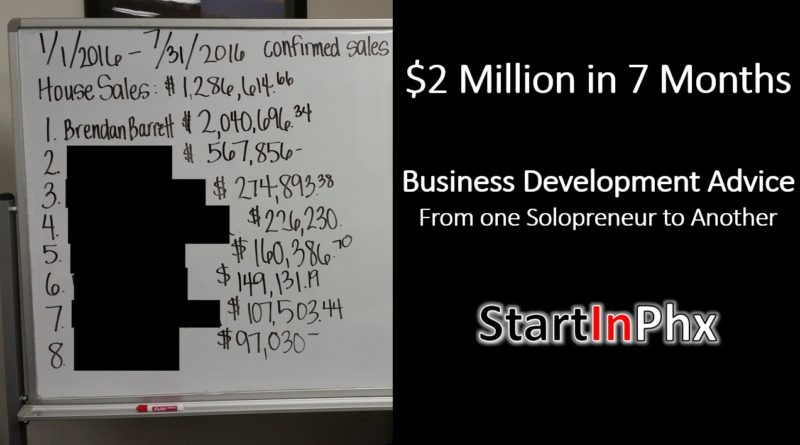$2 Million in Sales in 7 Months
Business Development Advice From one Solopreneur to Another
Earlier this month I attended the annual sales conference for a company I do business development for. Similar to being a real estate agent, my colleagues and I operate as independent businesses and are compensated for our performance in generating revenue; as would any other business owner.
I’ve been among the top performers in this group of solopreneurs for some time, but this year when the conference rolled around I was on top of the leader-board in terms of this year’s sales to date. I also held the lead by a pretty substantial margin compared to the top producers of previous years.
To accompany this status I was inundated with more questions than usual from my colleagues, about what it takes to build a successful business in our industry, and what they could do to build their business as quickly as possible. I think they were rather surprised to hear the simplicity of how I’ve built my success.
For some of the newer folks at the conference, our niche in the construction industry is a bit different from anything they’ve done before. Even for the seasoned business development and sales professionals in the room, the turn-around for deals – typically 30 to 90 days, but as long as +18 months in some cases– isn’t a sales cycle they are familiar with.
We work in geotechnical construction, marketing construction technologies and managing projects that use those technologies to lift and stabilize structures. Typically the projects involve buildings or roadways that are sinking or sliding because of deep soil issues.
[You can learn more about my work in geotechnical construction in this video: http://bit.ly/2byr2fG]
I can only assume that the contrast between the work we do and the work my colleagues have done in the past is why they are so surprised my advice for success in sales and business development is so simple. I was probably even more surprised then them however. So many of them were already doing the right things. So many of them are nearing the precipice of completely blowing-up in terms of revenue, and realizing the substantial growth they’ve been after, yet they still couldn’t see it for themselves.
Jeff Olson explains in his book The Slight Edge, the difference between high achievement and average is simple. These differences are subtle habits. So subtle that they can be extremely easy to overlook.
These slight edge habits and activities are the little things that we already know how to do. When we do them we actually realize blips of success, but many people start to deviate from these best-practices once they see the first signs of success. In doing so, that success then never grows beyond anything more than a blip.
Nick Loper, Chief Side Hustler at SideHustleNation.com, a blog dedicated to part-time entrepreneurship, attributes the growth of his business to the slight edge habit of producing a weekly podcast. Nick has been airing episodes of the The Side Hustle Show since 2013.
When I reached out to Nick about how his slight edge habits have impacted his business, Nick said, “Looking at the download trajectory, I can say the revenues and profits earned directly from Side Hustle Nation have mirrored that very closely.”
The revenue Nick generates from Side Hustle Nation [SHN] comes from sales of his own products and services, a private mastermind he began as SHN’s first revenue stream in early 2014, as well as sponsored content and commissions from affiliate marketing.
Nick’s revenue comes from a wide range of products and services, but the consistency in the way he goes to market is key to his ever growing success. As Nick’s story illustrates, growth in business plays out as a result of consistency, not over just weeks or months, but years.
In my own experience, I’ve seen peaks and valley, but I think serial entrepreneur Alyssa Rapp put it best when I interviewed her for the StartInPhx Career Success Q&A series, “Yes begets yes. Most things in life you get because you work hard, not just because you were lucky or smart.”
Of course, I think the subtlety in Alyssa’s words are that it takes hard work and a great deal of effort to be consistent. In my experience it is hardest to be consistent when the effort you put in won’t be realized for months. When it comes to business development and sales, the reality is that you could put in 98% of the effort and get none of the reward if you quit just short of realizing your goal.
There have certainly been times when a whole month would go by without a new deal being closed. When sales aren’t being closed that meant I wasn’t getting paid. In moments like that, when you have more time to prospect and place cold-calls than you really want to be on the phone or seated at your desk, it can be hard to find the motivation to be consistent in your activity.
On the other side of that same coin, when the endless prospecting turns into opportunities and sales that go from lead to closed deal in record time, I’ve found myself chalking it up to luck. I’ve had to remind myself that the opportunities that I find to sell more work or bigger projects are not luck. Even though I’ve toiled over the little things for years, still I have to remind myself that those bigger opportunities are a result of that consistent focus over time, not luck.
Similarly, as I sell more work the work, in a way, becomes part of the marketing. With each successful project that is sold and produced repeat business can be a result, as can referrals. Every time a client chooses to repeat doing business with me they are likely to place more and more trust in my recommendations for complementary services, giving even more growth to my revenue and requiring less and less time and resources to do so.
That is not to say I can stop prospecting for new clients. A slight edge habit of mine has always been prospecting, even when my pipeline is full of qualified and promising leads. So when asked, I’ll never say that a single year’s sales numbers are a result of that year’s effort.
The revenue I bring in on any given every year is built upon the effort I’ve made to educate my client base over the past year and the years prior. Over that time I’ve also worked to build a rapport that builds upon itself. It is a rapport of consistent service and that rapport is a marketing asset, an asset that only exists if slight edge habits continue to maintain the expected level of service.
What does it take to be consistent in business development?
In business development, as in life, it helps to know where you want to go, what you want to do, and then create a plan for accomplishing just that. Setting clear goals and then developing a strategy tailored to meeting those goals is a must.
Of course, you can’t be darting back and forth between strategies and tactics if you want any one thing to actually produce results. A successful commitment to slight edge habits means being long-term oriented, which isn’t natural for anyone.
It is a learned mindset. I had a lot of positive role models growing up – my parents, my grandparents, aunts and uncles, coaches, and teachers – that new how to work hard over a long period of time. They knew how to delay gratification in order to achieve bigger goals and being able to witness that growing up made a world of difference.
I don’t have these same people in my life on a daily basis like I did when I was younger. These days I have to take it upon myself to be within proximity of positive role models. I do this because even though I know what real effort looks like, constant reinforcement through the example of other people is what it takes to keep me accountable and disciplined in pursuit of my sales goals.
As I get more specific with what I want to accomplish I find it harder and harder to plug into communities that fosters motivation and put me in physical proximity to solid role models. In lieu of physical proximity to real-life examples of focused intensity over time, I consume media – articles, blog posts, podcasts, etc. – about people and organizations that live these kind of principles.
I’m always on the lookout for communities (in-person or online) full of people that have the discipline to execute a plan with focus. John Lee Dumas of Entrepreneur on Fire defines FOCUS as an acronym that means to, “Follow on course until success.” The execution of FOCUS can mean having to say no to new ideas that might divert your attention and effort from a business development strategy you’ve already set in motion.
The kind of consistency that makes slight edge activities so effective is what you get when you commit to following one course until success. Especially as a solopreneur – or owner of a small business – your resources and time are finite. The farther you try to stretch those resources the less consistent and effective you’ll actually be.
Chasing shinny objects isn’t just something solopreneurs struggle with, content marketing strategist Robert Rose considers it to be among the major struggles of marketing executives at the enterprise level as well. In an interview for Marketeer, Robert quotes Michael Porter to say, the “essence of strategy is choosing what not to do.” Robert then continues to explain, “The biggest obstacle is usually cultural, and figuring out what we can STOP doing.”
As a solopreneur that cultural pressure to continue a business development operation or implement something new isn’t coming from within your business, but it can come from your industry peers. Yes, the same people you look to for guidance and reinforcement of lessons you’ve already learned can be the source of distraction as well.
It can be easy to get in the habit of modeling other companies that have found success using one marketing tactic or another. Which is why it is important consult your priorities before shifting the focus of your business development effort. If in the grand scheme of things a tactic doesn’t jive with your unique set of goals, it isn’t worth your time to play with. It will only rob you of time to execute activities that actually make a difference.
How do you make the most of consistency in business development?
Another great benefit of consistency is the learning that ensues. In life, experience is said to be the best teacher and business development is no exception.
Of course, if you take the advice of Adriane Wilson, an accomplished sales and marketing professional you’d do everything you could to, “Own your own development.”
When I interviewed Adriane for an article I wrote for MsCareerGirl.com she explained, “Step-one is to take inventory of where you are in your career and where you want to be… so that other people can help you, so that you can identify the proper resources to help you. So really, step-one is to map your future.”
Adriane puts this same advice to use herself. For Adriane, mapping out the future it is a regular practice she incorporates through goal setting. She makes a point to write out her goals on a quarterly basis, making plans for the next year and beyond. According to Adriane, “When you write things down you are more committed to what is happening.” Which is something she believes has allowed her to succeed in sales, marketing, and entrepreneurship.
If you make ongoing education a priority, not only do you need to be constantly in search of how to improve upon your business development and sales specific skills, but you also need to be constantly learning about your industry as a whole.
No matter how long you’ve been in an industry there are always new dots to connect. New technologies can be learned and leveraged, new regulations will pop up from time to time, and the evolution of best-practices in business development can either improve your business or be used against you by the competition.
If you’re always learning you can anticipate business trends and account for them or even capitalize on them to grow your revenue. You’ll be able to be where your customers need you to be. As a solopreneur you can also learn to build the business that your customers actually need.
There will be a significant degree of trial-and-error that goes into refining your business development strategy and operations. Of course you can also save yourself a great deal of pain and headache by leveraging the people and resources you have around you once you’ve mapped the future of your business.
Something All Side-Hustlers and Solopreneurs Can Relate To
In a recent StartInPhx Career Success Q&A I interviewed Jason Rieman, an entrepreneur who does financial planning and tax consulting. While Jason has a wealth of experience in his niche, he admits that the sales and marketing functions of his business are where he needs the most improvement.
In Jason’s own words, “I find it difficult to consistently attract interested people to all I have to offer…I have a bleeding heart personality. It took me years to really grasp that to be in business, I actually need to make money.”
In the interview, Jason also shares that consistency in his marketing efforts is something that he lacks as a result of the time and energy consumed by providing service to his existing client base. I think solopreneurs everywhere can empathize with a father of two who is juggling the grind of a growing business.
Honoring existing streams of income is important, in a way, performing well for the clients we already have is the best kind of marketing. Jason isn’t the first to see consistency in his marketing efforts fall through the cracks on a long list of priorities.
It’s a tough situation to be in. I know because, I’ve been there myself. But, even though he may feel as if there isn’t much light at the end of the tunnel, Jason, like many of my colleagues at the recent sales conference, is doing a lot of the right things.
They are all putting themselves out there – one way or another – and learning what works in their individual markets. It can be hard to see the forest from the trees when it comes to things like this. They are all much closer to seeing significant growth in their businesses then they even realize. They just need to stay the course, commit to consistency in the business development tactics they choose, and keep a few simple principles in mind.
So here it is….
My Business Development Advice, From one Solopreneur to Another
Have Direction – Know the mission of your business and set goals before you start taking action.
Keep It Simple – Don’t over complicate your business development effort. Start with tactics you know or understand. Through repetition and consistency almost any form of business development and marketing can be dialed in and used successfully. Start small and build upon your successes. The simplest way to get people interested in what you do is to be your own biggest fan. All you have to do is talk about who you are and the value you bring to the world. This can be done in-person, over the phone, or online.
Be Selective – There are a million ways to market your business, but that doesn’t mean you should attempt to use them all. Only choose tactics you can implement consistently over time and that contribute to fulfilling the goals you’ve set for the company. Don’t attempt something you can’t do yourself or afford to pay someone else to execute over a period of months or years.
Do More of What Works – If you find a particular means of marketing that works really well in your space, exploit it. Do more of what works until more doesn’t produce more revenue. The only caveat here is that some tactics (i.e. forms of interruption marketing) will be acceptable by your target client in the short-term, but off-putting if you continue to use them. There is a fine line you want to be sure you never cross.
Always Be Learning – Not only should you always be searching for ways to improve your business development and sales skills, but you should be learning about your industry on an ongoing basis. Your industry and your client base are constantly evolving. If you aren’t in tune with that evolution you’ll stop growing and could be edged out of the market by your competition.
Master One Thing at a Time – As your company grows and you’re able to refine your operating processes you’ll find yourself with more time and money to explore new ways of reaching prospective clients. Don’t get caught up in new ideas at the expense of what is already working. Only add new tactics to your marketing mix if you can do so without negatively impacting your current revenue streams. Instead, focus on how you can improve the things you’re already doing everyday.
Leverage Mentors – You can save yourself a lot of time and effort by learning from the experience of those who came before you. By associating with people (in-person or online) who have already accomplished the goals you’re chasing now, not only can you learn ways of speeding your progress, but you can maintain the motivation to persevere. Simply by gaining the perspective of how long it has taken others to reach certain benchmarks of success, you might come to understand how close you actually are to realizing your own goals. That kind of perspective is priceless if you’ve already begun to contemplating whether or not to stay in business.
[FREE GUIDE] Start Marketing Your Own Small Business
5 Simple Tactics That Will Help You Get Your Business off the Ground
(Even If You’ve Never Sold Anything!)
[Click Here to Get Your Free Marketing Guide]
Have more specific business development questions?
Ask your questions in the comment section below and I’ll be sure to answer them all!






